| HORSES |
YEAR: 1903
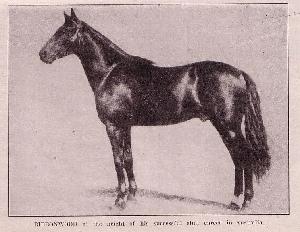 |
"Horse Of The Year"? Ribbonwood was the horse of a decade! Good as horses like Lunar Chance, Easton Light and Captain Harcourt are, there would have been little hope of their being in contention for the "Horse Of The Year" award had such a prize existed in 1903.
That was the year of Ribbonwood, one of the greatest pacers ever bred in this country and one of the most successful stallions ever to stand in Australia. Only a little fellow, he possibly achieved more in his short career in advancing the popularity of trotting here than any other champion who followed him, with the possible exception of Cardigan Bay.
Bred at New Brighton by Mr Gilbert McHaffie, a prominent administrator at the time, Ribbonwood was by the imported Wildwood from Dolly, a Young Irvington mare of disputed parentage tracing to a thoroughbred source. Wildwood was bred in California and was imported by Mr Henry Richardson of New Plymouth who passed him on to the Kerr brothers of New Brighton for £500 which was not exactly pocket money in those days.
Trained at two years of age by Manny Edwards, Ribbonwood attracted the attention of Dave Price the owner of Prince Imperial and also in earlier times of his dam Princess. Price paid out £250 for Ribbonwood which was easily a record price for a racing proposition in the trotting world of those days. Although Ribbonwood was not much more than a pony, Price was right on the mark with his buying. Ribbonwood quickly established himself as the fastest pacer in NZ and by the 1902 season, when a 4-year-old, he was being handicapped out of many of the big races. In the 1902-3 season he won nine races with one second placing and two fourths. His first two wins were at the November Addington meeting in which he won the NZ Handicap (£200: then our richest race) by eight lengths and the free-for-all by nearly the same margin.
In February 1903 at Addington he won the feature event by fifty yards in Australasian record time for two miles of 4:35.8. Later the same afternoon, he smashed the Australasian mile record held by Fritz, recording 2:11 2-5. Two Australasian marks on the same day must be a unigue feat.
In April of that season, Ribbonwood took part in the celebrated match races with the Australian champion trotter Fritz who was brought over from Australia by his owner J A Buckland. The match was over three heats for £500 a side. Huge crowds attended and the Prime Minister, Dick Seddon presented the trophies. Fritz had been over the Tasman before (in 1899) and was a tremendous favourite with the NZ crowds who supported him strongly on the totalisator, though many were backing from their heasts and not their heads. Fritz was then 12-years-old and well past his best, but Mr Buckland was a sportsman of the old school and refused to let Dave Price's challenge to pass.
Ribbonwood won the first heat by five lengths, the second by a length and a half and the third by eighty yards. In the last heat he again lowered the mile record, this time to 2:10 and he later lowered it again to 2:09 where it stayed for some years. After his exhibition mile of 2:09 on the final day of the meeting, Ribbonwood never raced in NZ again due largely to the six months suspension Price received during the meeting. He took his champion to Australia but there Ribbonwood was sold for stud duties before he raced.
In latter years Price regretted selling his little champion. He parted with for £1000 and the son of Wildwood earned nearly that much for his new owner in his first stud season. Before leaving NZ, Ribbonwood was lightly used as a stallion between races. He left 18 foals here and has the unique siring record of getting 18 winners or a 100% record. But even this paled beside his Australian record and the claim was made some years ago that only Globe Derby has left more winners across the Tasman than the New Brighton-bred stallion.
One of his most successful sons was Realm who was brought over to this country by Bill Tomkinson in 1921. A little black horse like his sire, Realm was enormously popular here as Ribbonwood had been before him and he also held the mile record of 2:03.8 for a time. It was a NZ son of Ribbonwood who had lowered the champion's own time. This was King Cole (2:08.4) who features in the pedigrees of many of our fastest pacers, particularly those bred by Ben Grice. Realm also had success at stud as did Blue Mountain King, a successful racing son of Ribbonwood imported to this country in the late '20s.
Down through the years Ribbonwood blood has continued to have some say in fast mile times. His full-sister Manuka never amounted to anything on the track but she was the fourth dam of Tactician the first NZ horse to break two minutes in a race in NZ and Ribbonwood's son Childewood, a very successful sire, sired Roselawn who was the dam of Lawn Derby the first horse to break two minutes in Australasia. His son King Cole is in the pedigree of Mt Eden, and Ribbonwood appears on both sides of the pedigree of the Australian speedster Reichman who recorded 1:58 on a three furlong track. There are numerous other top horses who carry Ribbonwood blood including Ribands, Apmat, Avian Derby, Dale's Gift, Thelma Globe and the wonderful Harold Logan to name but a few.
Ribbonwood died at twenty years of age. It is said Price sold him in Australia for stud duties because support for him in this country was lukewarm. If so, we encouraged the loss of one of the greatest sires ever bred here.
Credit: David McCarthy writing in NZ Trotguide 5Aug76
YEAR: 1950
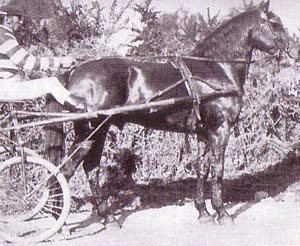 |
It is scarcely credible these days that an unregistered horse could win several races and become one of the best pacers and sires of his time. Yet Young Irvington, who was something of a star in the very early days of trotting and who became the most successful broodmare sire of his day, could not be included among the Colonial-bred sires in Volume X of the Trotting Stud Book because there was no official record of his registration.
Young Irvington, by Irvington-Bess, was a handsome black horse, one of the best-loking stallions ever seen on a race-track in NZ up to his time. Among his get were the dams of such notables as Ribbonwood, Our Thorpe, Almont, Lord Althorpe, Ghoai, Fushia, Manuka, Silver Princess, Monica, Miss Florrie C, Mauretania, Weary, Woodthorpe Maid, Ianto, Roseberry, Bright, Lady Child, Inwood and Prince Akwood.
Young Irvington was a natural pacer, never wearing a hopple or boot.
Credit: 'Old Timer' writing in NZ Trotting Calendar 24May50
YEAR: 1992
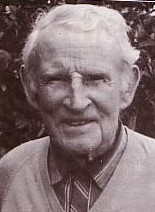 |
Maurice McTigue, who died at Ashburton aged 85, was, in his heyday, NZ trotting's leading owner-trainer, with a remarkable strike-rate for a one-man band.
An electrician early in life, McTigue in the early 1930s bred Waress, a filly by dual Auckland Cup winner Man o' War from Ivy Mac, a little mare whose dam Manuka (a straightout trotter) was a sister to champion pacer of the turn of the century, Ribbonwood. A staying type, Waress won five races, and, with her and other good performers in Fine Art, Morello and the dual-gaited Dark Hazard, McTigue burst into trotting's headlines in the '30s. Morello in 1938 gave McTigue a winning debut in the NZ Cup.
Waress produced a line of winners for McTigue, all by Jack Potts. The best of these, Plunder Bar, won 12 races and was twice second in the NZ Cup. Other good performers from Waress were Indigo and Vimy Ridge. Putting unraced Jack Potts mare Berengaria, the first foal of Waress, to Springfield Globe, McTigue bred Tactician.
Racing until he was 13, Tactician won 20 races, highlighted by his victory over Johnny Globe in the 1955 Inter-Dominion Final in Auckland. In beating False Step and Local Light in the Rattray Stakes at Addington in 1957 in 1:59 4/5, Tactician recorded the first sub-2:00 race mile outside America.
The first president of the Mid-Canterbury OTB Association and a past-president of the Methven Trotting Club, McTigue was survived by five children, including National Government Minister Maurice McTigue.
-1993 TAB Harness Racing Annual-
-o0o-
M C(Maurice)McTigue, a prominent Methven harness racing identity, the first President of the Mid-Canterbury OTB Association, and a past President of the Methven Trotting Club, died last week, aged 85.
Mr McTigue, a former electrician and the father of the present Minister of State-owned Enterprises, gained his biggest triumph in 1955 when he won the Inter-Dominion Grand Final with Tactician. He bred Tactician from Springfield Globe, winner of the 1939 Inter-Dominion Grand Final and Berengaria, the first foal from his good Man O'War mare, Waress (9 wins).
Tactician did not race until he was four, and won his first two, at Hawera. Mr McTigue was against racing horses at two, after he saw Plunder Bar beaten on a heavy track in the Sapling Stakes at Ashburton. Plunder Bar, which he bred from Waress, later became a top horse and won 12 races, but it took him 12 months before he was properly right again.
Long before Tactician came along, Mr McTigue had struck in the big races, winning the 1938 NZ Cup driving Morello. Tactician raced until he was 13, won 20 races, became the first outside the US to better 2:00 for a mile in a race and earned more than £25,000.
Among the other fine horses he raced were Loyal Rey (12wins), Great Divide (11), Precious Metal, Maharaj, Black Surprise, Indigo (8), King's Play, Messala, Kubla Khan (8), Golden Fleece (9), Grand Canal, Genghis Khan, Fine Art (14), Dark Hazard (11), Play On, West Point, Peter Polo, Royal Worthy and Loyal Friend.
Always active around his farm, Mr McTigue enjoyed a game of billiards and a beer at the 'local' until a year ago when he was hurt in a car accident.
Credit: NZ HRWeekly 2Sep92
YEAR: 1958
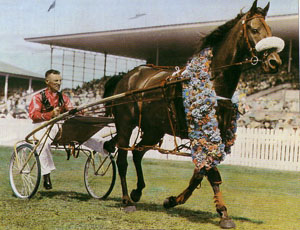 |
The 12-year-old Tactician gave further evidence that he is a hard-wearing veteran when he scored his fourth win under free-for-all conditions in the Forbury Handicap on the opening day of the Forbury Park Club's summer meeting. Leading all the way, he was not asked to over-exert himself - he averaged a 2.09 mile rate - and he was not in serious danger in the run in. In spite of his years, Tactician continues to be produced in great heart by his owner-trainer, M C McTigue, and the manner in which he scored his latest success indicates that he will hold his own under free-for-all conditions for some time yet.
Tactician is one of the greatest winners to have raced in the Dominion, and has now won £25,765 in stakes, the result of 19 wins and 28 placings (including 14 seconds) in 93 starts in his nine seasons of racing. The Springfield Globe gelding had perhaps lacked the personality to become an idol of racegoers like some pacers, but he has proved a grand performer, and has beaten all the best pacers of his time - and decisively at times, too. He seems to have specialised in upsetting the champions when it was least expected. A late start in racing - he did not have his first race until well on in his 4-year-old season, in March 1950 - probably accounts for him being able to turn in winning efforts in free-for-alls at the age of 12.
Tactician scored his greatest triumph at Auckland three years ago when he won the £10,000 Inter-Dominion Grand Final. But he has not proved a really genuine two miler when the pace has been on all the way, and he had Lady Luck on his side when he won the Inter-Dominion, for Johnny Globe was badly checked by a breaking horse with five furlongs to run, and then came with a paralysing finishing run, failing by only a head to get up.
Tactician has contested 6 NZ Cups, his best effort being at his first attempt in 1952 when he finished second to Mobile Globe on a track which did not suit him. His best effort over two miles was at the Easter meeting at Addington four years ago, when he beat Maori Home in the Rattray Handicap in 4.14 3/5.
At the Easter meeting in 1954 he won the free-for-all Electric Stakes by two lengths from Johnny Globe and Soangetaha, and followed this up by beating Johnny Globe, to whom he conceded six yards, in the Au Revoir Handicap on the final day, running the mile and a quarter in the then NZ record time of 2.34 1/5. Early in the 1954-55 season Tactician egualled the NZ record of 2.52 1/4 for a mile and three furlongs in running second to Caduceus from the 60 yard mark in the All-aged Stakes at Ashburton. He also ran some grand races at the NZ Cup meeting a little later. He set the scorching pace which enabled Johnny Globe to hoist the new world figures of 4.07 3/5 in his NZ Cup win; he ran Rupee to half a length in the Ollivier Free-for-all recording 3.07 2/5 for the mile and a half; and finishing fourth to Ribands, Rupee and Johnny Globe in the NZ Pacing Championship. His time fot the mile and five furlongs was 3.23 2/5.
Three months later he won the Inter-Dominion Final at Auckland, first qualifing with a brilliant win over Laureldale and Caduceus in a mile and five furlong heat. He wound up a highly successful season by running Rupee to a neck in the free-for-all Electric Stakes at Addington in 2.36. His winnings of £8655 placed him second to Johnny Globe (£10,105) on the leading stakes winner's list for the season.
Tactician scored only one win in the 1955-56 season, and it came in typical style when he raced right away to beat Johnny Globe by four lengths over a mile and a quarter in the NZ Free-For-All on the second day of the Cup meeting at Addington. On the third he finished fourth in 3.06 to Caduceus, Rupee and Johnny Globe in the record-breaking Ollivier Free-for-all, and on the final day he ran third to Johnny Globe and Rupee in the NZ Pacing Championship in 3.25 1/5. He had only one other start at Easter at Addington that season, when Johnny Globe beat him under free-for-all conditions.
Tactician scored two brilliant wins next season, the first being at Oamaru in October when he beat Johnny Globe and Our Roger in the Hannon Memorial Handicap. He marked another highlight in his career at Addington at Easter when he downed False Step and Local Light in the Rattray Stakes, recording 1.59 4/5 for the mile from a flying start to become the first pacer outside America to break two minutes under race conditions. On the second day of the meeting he was runner-up to False Step in the Electric Stakes, a race in which he had recorded one win and three seconds in the past four years.
The veteran had not won this season before his success at Forbury Park, but he was runner-up to Lookaway in the NZ Free-For-All at the NZ Cup meeting, and finished third behind Caduceus and False Step in the NZ Pacing Championship. A glance at Tactician's time record over all distances gives some idea of his greatness - 1m, 1.59 4/5; 1¼m 2.34 1/5; 1m 3f, 2.52 1/5; 1½m, 3.06; 1m 5f, 3.23 2/5; 2m 4.14 3/5.
Tactician has been a great money-spinner for M C McTigue, who has had a long association with the light-harness sport. Not only does he own, train and drive the veteran Springfield Globe gelding, but he also bred his dam, Berengaria, who is the dam also of Impresario. Berengaria, who was foaled in 1938, was by Jack Potts from Waress, by Man O' War from Ivy Mac, by General Mac from the Wildwood mare, Manuka, a sister to Ribbonwood. Waress, who was also bred by McTigue, was a particularly smart 3-year-old, winning five races at that age. She also won four times as a 4-year-old. At the stud she proved a great success, leaving several winners, all by Jack Potts. Plunder Bar (winner of 12 races and £16,554, and twice runner-up in the NZ Cup), Indigo (winner of eight races and £6436 10s), Vimy Ridge (winner of five races and £2378) and West Point were four fully related to Berengaria which McTigue raced with notable success.
Credit: 'Stopwatch' writing in NZ Trotting Calendar 5Feb58
YEAR: 1951
PLUNDER BAR
Plunder Bar, winner of £16,554 in stakes, and twice runner-up in the NZ Cup, has been retired by his owner-trainer, M C McTigue. Foaled in 1940, Plunder Bar has compiled an excellent record and he is one of the best stake-winners of recent years. He raced for nine seasons.
Plunder Bar commenced racing as a 2-year-old in the 1942-3 season and after four unplaced performances he ran second in the NZ Sapling Stakes, going under by a neck to Acropolis. The following term he started five times, running third in the Wellington Stakes, second in the Riccarton Stakes and fourth in the NZ Derby, won that year by Bonny Bridge. Plunder Bar throughout his career as a 4-year-old started 13 times for seven minor placings, including three seconds, and in his first six outings during the 1945-6 season he was four times second and once third. Plunder Bar was not destined to win a maiden race, his first success being registered in the Forbury Handicap, a 3.33 class race of one mile and a half, at Dunedin, when he won from 24yds behind in a big field. He continued to show to marked advantage and he completed the 1945-6 season with four wins and seven placings in 14 starts.
In the following term Plunder Bar maintained his progress towards the best classes, winning four races and running unplaced six times in 15 outings. His most important win to this stage was in the Smithson Handicap, of two miles, at Addington, in which Dundee Sandy and In The Mood finished second and third respectively from a strong field.
Plunder Bar won his way to NZ Cup company in August of 1947 when he won the National Handicap of two miles. He started from 24yds behind and covered the distance in 4.17 4/5 to beat Aberhall and Cameronian. However, sent out 2/2 in the betting, he failed badly in the NZ Cup, won that year for the first time by Highland Fling. Plunder Bar's only other win in that season came to him in the Final Handicap at New Brighton, but he also gained five minor placings during that period.
In 1948, after a third placing in the Louisson Handicap, won by Sprayman from Ingle Belmer, Plunder Bar made a second attempt on NZ Cup honours, and on this occasion he registered a notable contribution to light-harness history by carrying the field along at a solid pace, forcing the brilliant Highland Fling to return 4.10 3/5 - a world's pacing record for two miles - to beat him home. At a later meeting the same season Highland Fling again beat Plunder Bar at Addington, in the Canterbury Handicap, but Plunder Bar turned the tables on Highland Fling when on a heavy track he won the Mason Handicap, of one mile and five furlongs. At the same meeting, Canterbury Park, Plunder Bar also won the principal sprint event, the Farewell Handicap, from Checkmate and Globe Direct.
Last season, Plunder Bar started nine times, including an unplaced performance in the NZ Cup, and his only placings at that period came in the Au Revoir Handicap, in which he was second, and in the Auckland Cup when he finished third behind Captain Sandy and Dundee Sandy. This season Plunder Bar has been in action on 10 occasions. He has not been a winner, but he was again second in the NZ Cup. In this event he was prominent early and he took over the role of pacemaker with little more than a mile still to go. However, he found Chamfer his master and he was beaten by three lengths, Single Direct and Lady Averil being third and fourth.
Throughout a career extending over nine seasons, Plunder Bar started in 95 races, winning 12 and being placed on 37 occasions, to work his way to marks of 2.08, 2.42, 3.12, 3.29 and 4.19 over the various distances. His best times were 4.15 4/5 for two miles, 3.28 for one mile and five furlongs, and 2.39 for one mile and a quarter.
Plunder Bar, bred by his owner, is by Jack Potts from Waress, by Man o' War from Ivy Mac, by General Mac from Manuka, a full-sister to the famous Ribbonwood. This family has produced a number of winners, and Waress is also the dam of Vimy Ridge, Indigo, and West Point, all winning Jack Potts progeny, but Plunder Bar is easily the best of this line.
Credit: NZ Trotting Calendar 20Jun51
YEAR: 2009
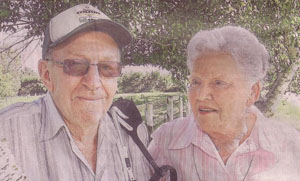 |
| Frank & Shirley Bebbington |
The Bebbington family has been involved with trotting horses for almost a century. Frank Bebbington's still training horses in his seventh decade and talks to David McCarthy about his experiences.
It was your grandfather who started it all off?
Yes, his name was Frank too and my father, Reg, trained as well. The other Frank had a good mare called Manuka which was a sister to (pacing champion of the Victorian ere) Ribbonwood. But he passed her on and a foal, I think, to Maurice McTigue and Frank McKendry. The filly, Ivy Mac, was a foundation mare for Maurice. It was where his best horse, Tactician, came from.
You and your dad trained a good one in Robert Medoro?
The Jamisons were next door to Dad. They had that very good breed but this one had a club foot and when a possible sale fell through we got him. He was by Medoro, a stallion we liked. He had been breed in Italy but was of all-American blood. In those days you couldn't bring a stallion in from America and he was one way round it. He was trotting bred, though actually most of the good horses he left were pacers. We had him at home trying to get his feet right. I don't think he raced until he was seven and ended up beating Snow Globe in the Hambletonian which was the big Easter trot in those days.
What about your first winner?
It was the first horse I trained and he came along exactly at the right time in 1960. I raced him with Gordon Cartwright who used to be my barber then. He bred him. His name was Whipaway and he won at Motukarara the same week Shirley and I were married. What we got out of it paid for the wedding, the honeymoon, the lot. I bred from a half-sister called Iron Maiden. She was a good mare and left some good horses including Avalon Globe who sired a grand trotter we raced called Globe Tour.
You seem to favour trotters?
It is just the way it has worked out really, but I must say I enjoy developing a good trotter. I did my own shoeing and it was a big part of it. You can't condemn a trotting horse if it lacks early speed, especially if it has got breeding. Sooner or later something will come of it, if it has the pedigree. In the old days the trotters were horses too slow on the pace, and some of those old trainers took six months to get them just to trot. It is a lot different now.
Some people say the ones now are not as tough?
I suppose it is right but you have to remember they are not trained to be tough like they used to be. Maurice McTigue, Ossie Hooper, Billy Doyle and those blokes did a lot of road work with their horses. Paul Nairn is still doing it but the roads around here now are too risky. Ted Lowe used to jog his pacers for half an hour before he fast worked them. People don't have time for that any more.
How did you get Globe Tour?
Though a friend mine from Murchison, Dave Oxnam. He gave me some young horses to take home from Nelson one day and educate. They were pretty rough and getting them home was an achievement but they turned out alright. He was breeding from a horse called Protector there.
Protector became famous when horses like Nigel Craig were racing but came from nowhere.
A bloke called Charlie McHugh who was basically a car dealer was sort of behind him. He was unusual in that they had him running with the mares when he was two and he had stock racing before he did. He had ability but by then he wasn't interested in racing by the time he got there, only the mares around the track and (stipe) Len Butterfield wanted him out of it. Dave Oxnam had a remarkable piece of luck to get some of his best rachorses.
Like?
He was breeding thoroughbreds and when it was suggested he switch to trotters he wanted to know where to get some mares from. He was sent to Joe Hampton at Upper Riccarton for a couple, but Joe said he had sent them to the knackery the day before. It was the weekend and Joe said Dave might be able to get them there before the gun was fired. He just made it. They were waiting in the paddock. He took the two mares home and bred them to Protector in Murchison where he was a butcher and a farmer. One, Propetre, left the champion trotter Nigel Craig which set the mile record and the other Shendi Lass, left one of the best trotters we ever had in Royal Armour. She left some other good ones too. Trafalgar was a really good trotter she left. He was well known up Nelson way. A great staying horse.
I see Globe Tour won seven races one season at four?
A grand wee trotter. He went in the wind. I think it ran in the family because Royal Armour did the same. We operated on them but it was much harder to get it to work then.
Your daughter, Lynne, drove Globe Tour?
Lynne did everything with him. She broke him in, shod him, drove him, the lot. Then she got married to Andrew Neal. She had her photo taken in her wedding dress with him before she went to the church. Jim Ferguson got up at the wedding and told Andrew he was not only getting a lovely wife but an expert blacksmith.
You also stood stallions and one of them was Mercedes. That must have been a challenge?
He was a brute. Ted Lowe was in Ashburton hospital when the news came out we were going to stand him. He told the nurse to leave the bed next to him vacant because soon after Mercedes arrived Frank Bebbington would be needing it.
I remember seeing him in Auckland and he was a man-eater. How did you survive?
He had killed a bloke in America and he would have done here with half a chance. We heard the stories from up north where Ted Hooper had him. They told me he always had to have two headstalls on. If there was only one somebody would cop it. We couldn't get a headstall on him. You couldn't handle him. In the end we shot darts into him but it didn't seem to make any difference.
What was the solution?
We built a race right outside his stall. You had to have those sort of things to get anywhere. When he ran into the race we blocked it and tried to get a headstall on him from above where he couldn't get at us. We still had the darts as well. He always had to have someone on a pole either side when you could catch him. Gary Argyle was working for us then. I don't think I have ever seen anybody get over a big rail as fast as he did one day when Mercedes was going to eat him.
Was he a success?
Well of course he left Luxury Liner up north who was a great horse otherwise I suppose nobody would have bothered. We used natural service with him - you had no chance collecting semen for AI - and the first mare he served left twins. I thought that summed it up really.
Best horse you have seen?
Johnny Globe was a favourite of mine. I know everyone says that but he was for me. Mount Eden was a horse with terrific speed. He was the fastest I have seen.
Credit: David McCarthy writing in The Press 7Nov09